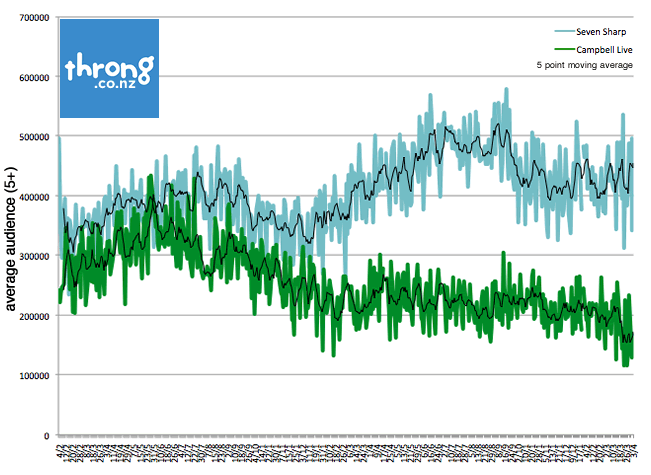He made it to ten years, and on reflection, he was bloody lucky to get there.
The axing of John Campbell’s show and his departure from Mediaworks is a real loss for journalism.
But it points to a larger shift in viewing habits and tastes of TV viewers who, we are told, are getting their hard news fix online during the day and therefore looking for something lighter and more entertaining in the evenings.
The switch from Close Up on One to Seven Sharp and now the demise of Campbell Live, are symbolic of that trend.
This ratings graph from Throng and the accompanying commentary, says it all.
Campbell Live viewers may have rallied to support the embattled host and his team when news broke that the show was on the chopping block. But the trend has been negative for some time now and with Mediaworks under pressure to make a return for its investors, the realities of commercial TV have set in.
When Seven Sharp first appeared, some scientists told us they didn’t want to appear on it, because they were worried their science would be trivialised. But as the show bedded down it proved that science stories could be successfully delivered in the new format. A piece on sea level rise with climate scientist Dr Jim Renwick, for instance, was well executed and this Gill Higgins piece on the HPV vaccination was a great way to explore the issue through experiential journalism – a mother exploring whether to have her daughter vaccinated.
We will all miss the quality reporting delivered on Campbell Live, which often delved into science-related issues. It’s story last week on the research confirming previous mega-thrust earthquakes in New Zealand, for instance, was top-notch. We all remember the notorious interview Campbell did with “Moon Man” Ken Ring – a well-intentioned but disastrous attempt to call Ring out on his pseudoscience. But Campbell Live followed up the piece with a quality examination of why earthquakes are so hard to predict. That’s what we loved about Campbell Live – they weren’t into quick hits, they revisited stories again and again if necessary – witness the show’s support of the people of Christchurch in the wake of the earthquakes.
The 7pm slot of TV3 will no doubt bring us more infotainment and lighter content, similar to Seven Sharp. That will not be current affairs as we traditionally know if, but it is still a powerful vehicle to explore science, health and environment-related issues and in a way that meets the needs of TV viewers swamped with streaming and online viewing options.
John Campbell will go on to great things, as will the members of his talented team. Science communicators need to adapt to the changing media landscape and those changes are keeping us on our toes more than ever before.
